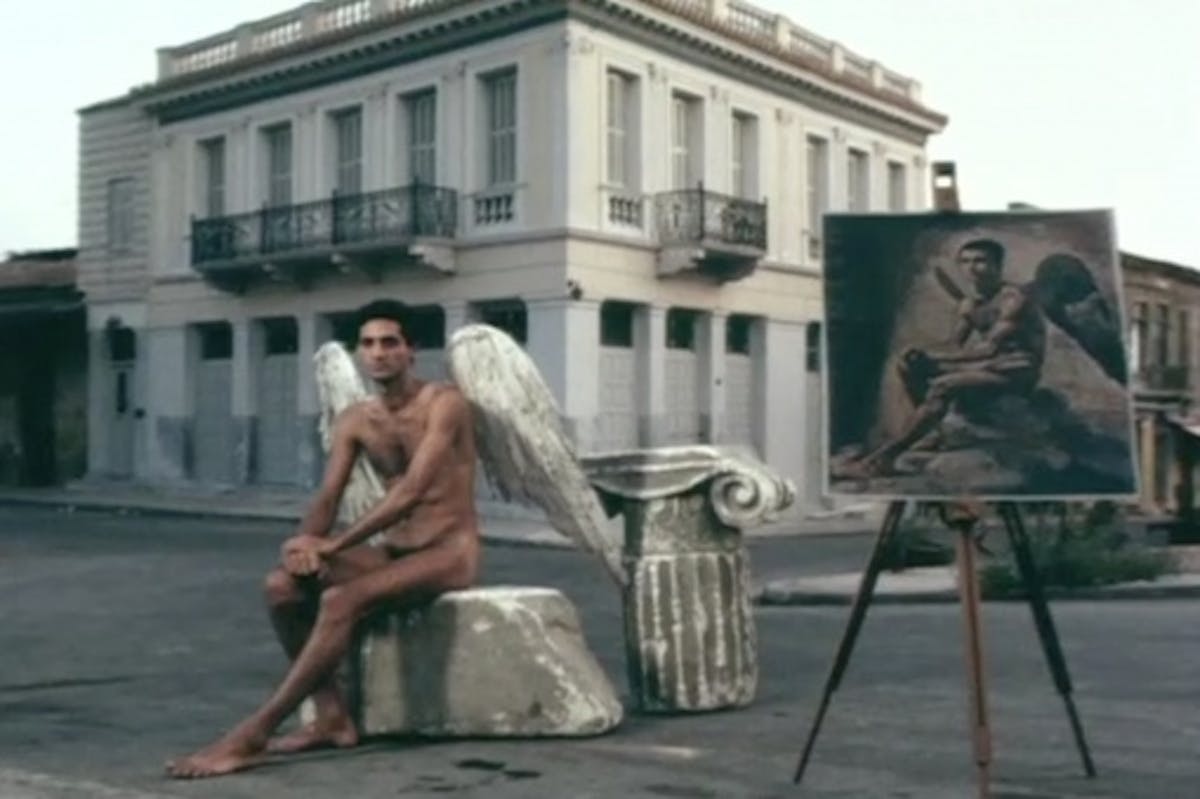Landscapes of Time: The Films of Theo Angelopoulos Oct. 14-Dec. 18

LOS ANGELES – The UCLA Film & Television Archive and the UCLA Stavros Niarchos Foundation Center for the Study of Hellenic Culture, with the collaboration of the UCLA Center for European and Russian Studies, present Landscapes of Time: The Films of Theo Angelopoulos from October 14 through December 18.
This major career retrospective includes all of Greek writer-director Theo Angelopoulos’ feature films and a selection of shorts. Internationally recognized as one of the most important auteurs of his generation, Angelopoulos’ films address formal and thematic concerns that are urgently relevant today and ripe for rediscovery.
The series will launch on Friday, October 14 with opening remarks by Consul General of Greece in Los Angeles Ioannis Stamatekos. The Archive and its partners will also be announcing additional, related events and special guests over the course of the series as we celebrate and engage with Angelopoulos’ life and career.
“Over a nearly five-decade career, Theo Angelopoulos explored the intersections of history and memory, time and place, through a powerful, personal vision that has had a profound impact on generations of audiences and artists, alike,” said Paul Malcolm, senior public programmer of the Archive, a division of UCLA Library. “With the essential support of our campus and community partners, we’re thrilled to present this rare opportunity to experience the work of a true giant of international auteur cinema on the big screen.”
“It is an honor for the UCLA SNF Hellenic Center to co-present the work of a Greek director whose work made a lasting impact on filmmaking on an international scale. His intensely political, highly intellectual, and visually stunning works inspire the viewer to think, reflect, and dream,” said Sharon E. J. Gerstel, director of the UCLA Stavros Niarchos Foundation Center for the Study of Hellenic Culture. “The themes he explored in his films, particularly immigration and displacement, are as relevant today as they were when the films were first made. No one can leave an Angelopoulos film and not be touched by the power of his vision.”
Screenings are held at the Billy Wilder Theater at the Hammer Museum 10899 Wilshire Boulevard in Los Angeles. All UCLA Film & Television Archive programs are free through June 2023, thanks to a gift from an anonymous donor. This program is being presented under the auspices of the Consulate General of Greece in Los Angeles and in collaboration with community partner the Los Angeles Greek Film Festival.
- Friday, October 14, 7:30 PM
Landscape in the Mist (Topio stin Omichli, Greece/France/Italy, 1988)
A young girl and her brother run away to find the father they’ve never met in Germany. Ducking train conductors and hitching rides, they’re befriended by Orestes, a young man working with a troupe of traveling actors before his compulsory military service. Theo Angelopoulos conceived the children’s journey as a modern fairytale, albeit one marked as much by darkness as wonder.
- Saturday, October 15, 7:30 PM
Eternity and a Day (Mia Aioniotita kai mia Mera, France/Italy/Greece/Germany 1998)
Bruno Ganz plays a famed Greek author grown despondent following the death of his wife and his own recent terminal diagnosis. Lost in reveries of the past, he’s snapped back to life when he helps an Albanian refugee boy escape a police roundup in Angelopoulos’ profound meditation on the boundaries that divide us.
- Friday, October 21, 7:30 PM
Days of ’36 (Meres tou ’36, Greece, 1972)
A political assassination kicks off Theo Angelopoulos’ portrait of one Greek dictatorship made under the shadow of another. This opening act of violence triggers a series of more ambiguous but equally ominous machinations— a prison escape, a hostage crisis, foreign powers conspiring over cocktails— with Angelopoulos emphasizing the atmosphere and anxiety of political repression over specific historical events.
- Friday, October 28, 7:30 PM
Voyage to Cythera (Taxidi sta Kithira, Greece, 1984)
After years living in exile in the Soviet Union, a communist resistance fighter, Spyros (Manos Katrakis), returns home to the dismay of his family and neighbors. With his sudden, defiant presence, Spyros threatens to disrupt their efforts to excise the past through art or commerce in Angelopoulos’ reworking of the myth of Odysseus’ return.
- Sunday, October 30, 7 PM
The Suspended Step of the Stork (To Meteoro Vima tou Pelargou, Greece, 1991)
When a TV journalist believes he’s found a missing Greek politician living in a refugee camp, a routine story becomes a potential blockbuster. A world-weary Marcello Mastroianni plays the mysterious refugee with Jeanne Moreau as the politician’s embittered wife in Angelopoulos’ sharp assault on the moral and political failures of the West that led to the international refugee crisis.
The Beekeeper (O Melissokomos, Greece, 1986)
Every year, Spyros (Marcello Mastroianni) transports a colony of bees across the rugged northern Greek countryside. This season, however, he’s joined by a young woman (Nadia Mourouzi) who picks up hitchhiking. Mastroianni delivers a quiet performance that draws us deep into the film’s existential crisis as a generation consumed by history confronts another in the process of forgetting it.
- Friday, November 4, 7:30 PM
Alexander the Great (O Megalexandros, Greece, 1980)
Theo Angelopoulos insisted this was his “most simple film” for its linear structure, beginning at New Year’s Eve 1900 and proceeding from there. The film’s straightforward chronology belies the complex interplay of Greek Orthodox and Byzantine liturgy, music and ritual that Angelopoulos weaves into this newly urgent fable of a would-be liberator who devolves into despotism.
- Sunday, November 6, 7 PM
The Hunters (I Kynighi, Greece, 1977)
When a hunting party finds the body of a communist partisan perfectly preserved in the snow, they carry it back to their lakeside lodge to open a formal inquest. These representatives of the conservative elite— politicians, military officers, businessmen, media figures— who have gathered to celebrate New Year’s Eve 1977, are suddenly confronted by the horrors that put them in power.
- Sunday, November 13, 7 PM
The Weeping Meadow (To Livadi pou Dakryzei, Greece, 2004)
The Weeping Meadow spans the decades leading up to the Greek Civil War in 1949 as they buffet the lives of Eleni and her adoptive brother and lover Alexis. Taken in by Alexis’ family, Eleni and Alexis fall in love and flee his oppressive father with the help of itinerant musicians touring the country as it descends into war.
- Sunday, November 20, 7 PM
The Dust of Time (Greece/Italy/Germany/Russia, 2008)
The Dust of Time follows a filmmaker named A (Willem Dafoe) on a journey to make a film about his parents. Moving between past and present, memory and history, fiction and reality, the film spans the second half of the 20th century as A traces his parents’ émigré story from Russia to the U.S., Canada and then Germany.
- Friday, December 2, 7:30 PM
The Broadcast (Ekpompi, Greece, 1968)
In the manner of Jean Rouch’s Chronique d’un été (1961), the producers of a pop music television show hit the streets to ask women what makes the ideal man.
Athens, Return to the Acropolis (Athina, epistrofi stin Akropoli, Greece, 1983)
Commissioned as an episode for a television series on the cultural capitals of Europe, Theo Angelopoulos structured Athens, Return to the Acropolis as a personal journey through the city where he was born and raised.
Reconstruction (Anaparastassi, Greece, 1970)
After years working abroad in Germany, a husband returns to his rural village to be murdered by his wife and her lover. Police and media descend on the town to investigate but Theo Angelopoulos uses the film’s true crime story as a pretext to explore the devastating impact of economic change on an entire region.
- Friday, December 16, 7:30 PM
Ulysses’ Gaze (To Vlemma tou Odissea, Greece, 1995)
Theo Angelopoulos once confessed, “I would like to believe the world will be saved by the cinema.” Ulysses’ Gaze gives this hope form as a Greek filmmaker known as A (Harvey Keitel) hunts for lost reels of film shot by the Manaki Brothers, real-life film pioneers who made the first movies in the Balkans, as the region is engulfed by war.
- Sunday, December 18, 7 PM
The Travelling Players (O Thiasos, Greece, 1975)
This powerful vision of postwar Greek history as experienced by a troupe of actors on perennial tour announced Theo Angelopoulos as a major international auteur. The multi- generational ensemble drags itself from one train station and theater to the next, seemingly inured to the sweep of politics and war, until they each, inevitably, become enmeshed with the tumult of their times.
For details, updates, registration information and important health guidelines, please visit cinema.ucla.edu. Schedules and guest speakers subject to change.

